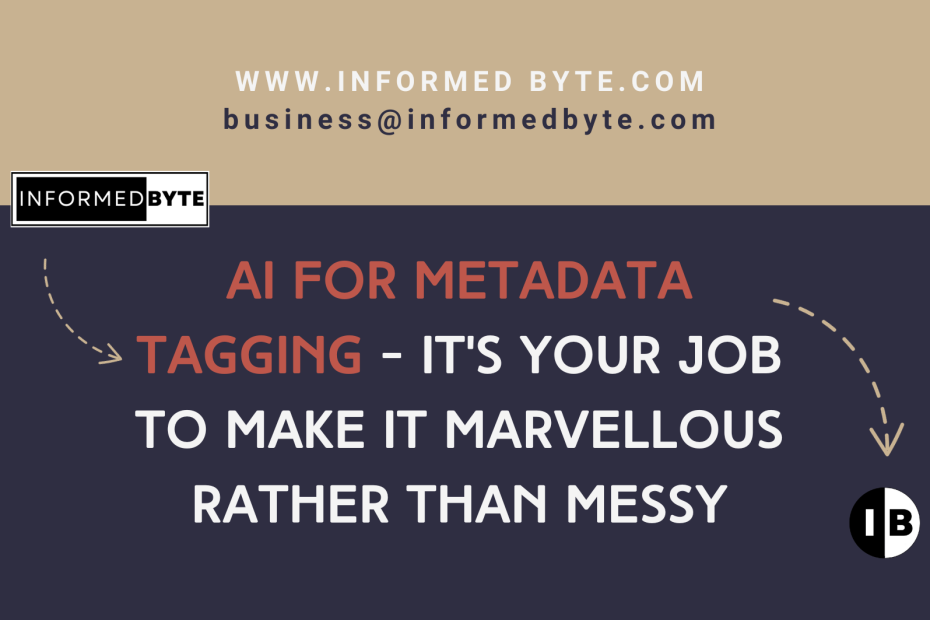AI for metadata tagging – it’s your job to make it marvellous rather than messy.
September 14, 2023
Automated Metadata Tagging: Enhancing Content Management and Discovery
In today’s information-rich digital landscape, the sheer volume of content being generated and shared across various platforms can quickly become overwhelming. Whether it’s documents, images, videos, or other forms of media, effective content management and discovery rely on accurate and consistent metadata tagging. Metadata, often referred to as “data about data,” provides essential context and categorisation for digital assets, enabling efficient organisation, search, and retrieval. However, manually tagging content with appropriate metadata can be a time-consuming and error-prone task. This is where automated metadata tagging steps in, leveraging technologies like artificial intelligence (AI) and machine learning (ML) to streamline the process while maintaining or even enhancing accuracy.
The Power of Automated Metadata Tagging
Automated metadata tagging involves the use of AI and ML algorithms to analyse the content and generate relevant metadata tags automatically. This process not only reduces the burden on human resources but also ensures consistent and standardised tagging across large datasets. By analysing the content’s textual, visual, and contextual attributes, these algorithms can identify keywords, concepts, topics, and even sentiments associated with the content.
Moreover, automated metadata tagging goes beyond mere efficiency; it can improve the precision of tagging. Traditional manual tagging might be subjective and influenced by the tagger’s interpretation, leading to inconsistent or inadequate tagging. Automation, on the other hand, can provide a more objective and data-driven approach to tagging, enhancing the quality of metadata associated with each asset.
Expert views
According to Pew Research Centre, and a whole range of experts https://www.pewresearch.org/internet/wp-content/uploads/sites/9/2023/06/PI_2023.06.21_Best-Worst-Digital-Life_2035_FINAL.pdf, it’s not all good news. It’s necessarily bad either but we can’t just step back and let it happen, it needs to be monitored, regulated and controlled.
This is the time when human interaction and metadata expertise is required. AI needs humans, it needs guidance, it needs correction. AI did not sit in the project last meeting, it does not know that an organisational strategy has changed direction, it is unaware of the unhappy stakeholder. AI knows no consequence or responsibility and has no appreciation of daily business challenges or satisfaction, for this human resources are vital for successful outcomes.
Benefits and Challenges
The benefits of automated metadata tagging extend far beyond efficiency and accuracy. One of the most significant advantages is enhanced content discoverability. Well-tagged content becomes more easily searchable, enabling users to find relevant information quickly. This is particularly crucial for businesses and organizations that deal with extensive content libraries, where efficient search and retrieval can translate into improved productivity and decision-making.
Furthermore, automated tagging can foster improved user experiences. Websites, digital asset management systems, and media platforms can leverage metadata to provide personalised recommendations, guiding users toward content aligned with their preferences. This can lead to increased user engagement and satisfaction.
However, automated metadata tagging isn’t devoid of challenges. The algorithms’ accuracy heavily relies on the quality and diversity of the training data they receive. Biases present in the training data can result in skewed or inaccurate tagging, perpetuating existing biases in the content categorisation process. Ensuring that the algorithms are trained on diverse and representative datasets is a critical step in mitigating this issue.
In conclusion, automated metadata tagging stands as a pivotal advancement in the realm of content management. Through the integration of AI and ML, this approach not only enhances efficiency but also improves the accuracy and consistency of metadata, ultimately enhancing content discovery and user experiences. As the digital landscape continues to evolve, embracing automated metadata tagging will be crucial for organisations seeking to navigate the vast sea of information effectively. AI is a highly capable worker only when managed by a highly capable human.
References
Anderson, J. & Rainie, L. (2023). Pew Research Center, June 2023, “Experts Predict the Best and Worst Changes in Digital Life by 2035”.
Let us contact you for a quick, free, discussion about your needs
